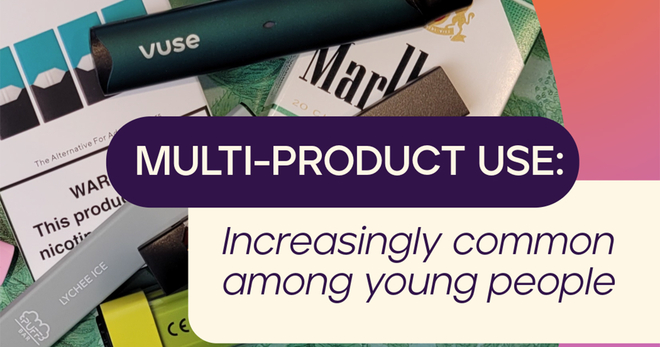JUUL use doubles in one year, driving ’unprecedented increase’ in tobacco use among young people
The percentage of young people aged 15-34 who have ever used JUUL more than doubled between 2018 and 2019, according to a new Truth Initiative® study published in JAMA Pediatrics that also shows an alarming increase in use frequency.
Researchers call the jump an “unprecedented increase in tobacco product use among young people” that highlights how JUUL continues to drive the youth e-cigarette epidemic. In 2019, National Youth Tobacco Survey (NYTS) data showed that more than a quarter of high schoolers (27.5%) vaped at least once in the past month, up from 20.8% in 2018.
“This research contributes to a growing body of evidence that e-cigarette use, particularly JUUL use, is becoming an accepted part of youth culture,” the authors write.

Frequency of using JUUL is also on the rise.
Is youth vaping on the rise
The findings show an increasing percentage of young people using the device regularly, underscoring that young people are not just experimenting with JUUL.
More than one-third of current JUUL users (37.6%) in 2019 reported using JUUL on 10 or more days per month, compared to 26.1% of current JUUL users in 2018. According to the authors, “claims that youth only experiment or use JUUL infrequently are not supported by documented patterns in JUUL use over the last two years.”
Increasing rates of JUUL and other e-cigarette use are driving overall youth tobacco use to levels unseen in nearly two decades.
JUUL appeals to teens who were not previously at risk for smoking.
If teens weren't vaping would they just be smoking cigarettes
In 2019, more than half of all respondents aged 15-17 who had ever used JUUL had never used combustible tobacco before, signaling that JUUL appeals to young people who were not at risk of starting to smoke.
Youth and young adults reported higher rates of current JUUL use, with 8.2% of 21- to 24-year-olds, 12.8% of 18- to 20-year-olds and 7.8% of 15- to 17-year-olds using JUUL in the past month, compared to older age groups (2.9%). The slant toward use among younger people is indicative of JUUL’s reliance on marketing tactics historically used by the tobacco industry to target young people — reinventing them for the digital age via social media and other youth-friendly outlets.
In addition to younger age, certain demographics were at higher risk for increased JUUL use, including whites, Hispanics, males and those identifying as LGBTQ. Those who had never previously used e-cigarettes were more likely to become a current JUUL user if they were younger, smoked regular cigarettes, believed that e-cigarettes weren’t as harmful as cigarettes, were sensation-seeking, and had more friends who used e-cigarettes.
Findings from this study underscore the critical need for increased e-cigarette product regulation at all levels of government to help reduce access, appeal and exposure to promotional efforts. Truth Initiative continues to urge the presidential administration and the Food and Drug Administration to reconsider the flavored e-cigarette policy announced in December 2019, which includes major exemptions, and to restrict access to all flavored e-cigarettes in all retail outlets until they have gone through the pre-market review clearly required by law.
This study pulled data from the Truth Longitudinal Cohort, a national cohort established in 2014 to evaluate truth®, one of the largest and most successful youth tobacco prevention campaigns in the United States. The sample for this study includes responses from 14,379 participants ages 15-34 collected February to May 2018 and 12,114 participants in the same age range collected February to May 2019.
Truth Initiative launched a first-of-its-kind program to help young people quit vaping. This is Quitting gives youth and young adults the motivation and support they need to ditch JUUL and other e-cigarettes.
More in emerging tobacco products
Want support quitting? Join EX Program
By clicking JOIN, you agree to the Terms, Text Message Terms and Privacy Policy.
Msg&Data rates may apply; msgs are automated.


